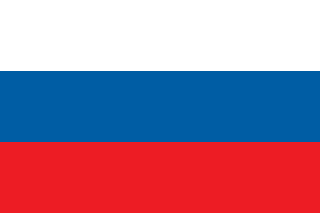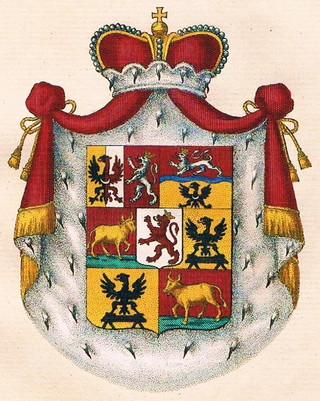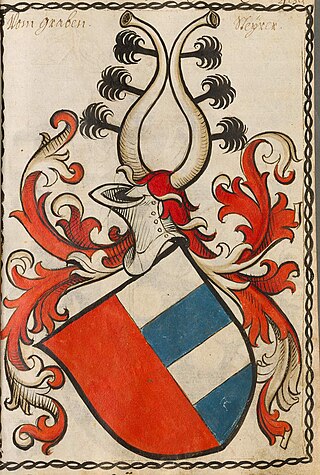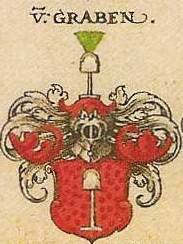
The Counts of Celje or the Counts of Cilli were the most influential late medieval noble dynasty on the territory of present-day Slovenia. Risen as vassals of the Habsburg dukes of Styria in the early 14th century, they ruled the County of Cilli as immediate counts (Reichsgrafen) from 1341 and rose to Princes of the Holy Roman Empire in 1436.

Spittal an der Drau is a town in the western part of the Austrian federal state of Carinthia. It is the administrative centre of Spittal an der Drau District, Austria's second largest district (Bezirk) by area.

The Duchy of Carniola was an imperial estate of the Holy Roman Empire, established under Habsburg rule on the territory of the former East Frankish March of Carniola in 1364. A hereditary land of the Habsburg monarchy, it became a constituent land of the Austrian Empire in 1804 and part of the Kingdom of Illyria until 1849. A separate crown land from 1849, it was incorporated into the Cisleithanian territories of Austria-Hungary from 1867 until the state's dissolution in 1918. Its capital was German: Laibach, today Ljubljana.

The House of Auersperg is an Austrian princely family, which once held estates in the Holy Roman Empire. The princely family of Auersperg originated as a junior branch of the comital line of Auersperg from Carniola, one of the hereditary Habsburg duchies in what is now Slovenia. The Auerspergs were raised to princely status in 1653, and they became "immediate" princes of the Holy Roman Empire in 1664. The princes of Auersperg also held at various times the duchies of Münsterberg and Gottschee. Their territories were mediatised by Austria and Baden in 1806, and the family is counted as high nobility.

The County of Gorizia, from 1365 Princely County of Gorizia, was a State of the Holy Roman Empire. Originally mediate Vogts of the Patriarchs of Aquileia, the Counts of Gorizia (Meinhardiner) ruled over several fiefs in the area of Lienz and in the Friuli region of northeastern Italy with their residence at Gorizia (Görz).

The Counts of Gorizia, also known as the Meinhardiner, were a comital, princely and ducal dynasty in the Holy Roman Empire. Named after Gorizia Castle in Gorizia, they were originally "advocates" (Vogts) in the Patriarchate of Aquileia who ruled the County of Gorizia (Görz) from the early 12th century until the year 1500. Staunch supporters of the Emperors against the papacy, they reached the height of their power in the aftermath of the battle of Marchfeld between the 1280s and 1310s, when they controlled most of contemporary Slovenia, western and south-western Austria and north-eastern Italy mostly as (princely) Counts of Gorizia and Tyrol, Landgraves of Savinja and Dukes of Carinthia and Carniola. After 1335, they began a steady decline until their territories shrunk back to the original County of Gorizia by the mid 1370s. Their remaining lands were inherited by the Habsburg ruler Maximilian I.

Ulrich II, or Ulrich of Celje, was the last Princely Count of Celje. At the time of his death, he was captain general and de facto regent of Hungary, ban (governor) of Slavonia, Croatia and Dalmatia and feudal lord of vast areas in present-day Slovenia, Croatia, Bosnia, Austria, and Slovakia. He was also a claimant to the Bosnian throne. He was killed by agents of the Hunyadi clan under unknown circumstances, which plunged Hungary into civil unrest that was resolved a year later by the sudden death of king Ladislas the Posthumous and the election of Matthias Corvinus, the son of John Hunyadi and Ulrich's son-in-law, as king. Ulrich's possessions in the Holy Roman Empire were inherited by Emperor Frederick III, while his possessions in Hungary were reverted to the crown.

Sommeregg is a medieval castle near Seeboden in the Austrian state of Carinthia, Austria. It is situated in the foothills of the Nock Mountains at an altitude of 749 m.

Virgil von Graben, also Virgil vom Graben, was an Austrian noble, politician and diplomat. He was one of the most important noblemen and officials in the County of Gorizia and in the Habsburg Empire of Frederick III. and Maximilian I.

Andreas von Graben zu Sommeregg was a Carinthian knight and nobleman residing at Sommeregg Castle. He served as a burgrave and castellan governor in the Ortenburg estates, held by the Counts of Celje until 1456. With the extinction of the Cillier family, Von Graben lost the post of captain of the County of Ortenburg under the Habsburgs, their successors as Ortenburg sovereign.
Rosina von Graben von Rain, also called Rosina von Rain, was an Austrian noble woman, a member of the Graben von Stein family and heiress of the burgraviate of Sommeregg Castle in Carinthia.

Herren von Graben, also named von (dem) Graben, vom Graben, Grabner, Grabner zu Rosenburg, Graben zu Kornberg, Graben zu Sommeregg, Graben von (zum) Stein, and ab dem Graben was the name of an old (Uradel) Austrian noble family.

Frederick II von Graben, also called Frederick the Younger, was a Styrian noble, a member of the edelfrei Von Graben family. He held the titles as Lord of Kornberg and Marburg, the Lordship Marburg as well as burgrave of Riegersburg. One of the most affluent Styrian nobles, Frederick was an advisor to the Habsburg emperor Frederick III, where he held a special position, assessor at the Reichskammergericht, and member of the duchy's Landtag assembly.

Ulrich II von Graben was a Styrian noble, a member of the edelfrei Von Graben family. He held the titles as Lord of Kornberg and Graben Castle, as well as burgrave of Gleichenberg, Rothenfels and Hohenwang.

Ulrich III von Graben was a member of the Austrian nobility, Lord of Kornberg, (Ober)Radkersburg, Grabenhofen, Graben and the Lordship Marburg, Obermarburg and Maribor Castle.

Jelendol is a settlement south of Rakitnica in the Municipality of Ribnica in southern Slovenia. The area is part of the traditional region of Lower Carniola and is now included in the Southeast Slovenia Statistical Region.
This is the family tree of the Austrian Von Graben family. Originally from Carniola, the House Von Graben is an apparent branch of the House of Meinhardin. The family went on to rule some Carinthian, Tyrolian, East Tyrols, modern Italian, Styrian, and Gorizian districts as Burggrafen and Lords (Herren) from the early Middle Ages until the 16th–17th century.

Count Maximilian Ulrich von Kaunitz-Rietberg was an Austrian diplomat and politician who served as governor of Moravia from 1720 until his death. He was the father of the powerful state chancellor of Maria Theresa, Holy Roman Empress and Queen Regnant of Bohemia and Hungary, Wenzel Anton, Prince of Kaunitz-Rietberg.

Ulrich I von (vom) Graben was a burgrave and knight from the Austrian Herren von Graben family
Ulrich von Graben may refer to several Austrian noblemen, including:














